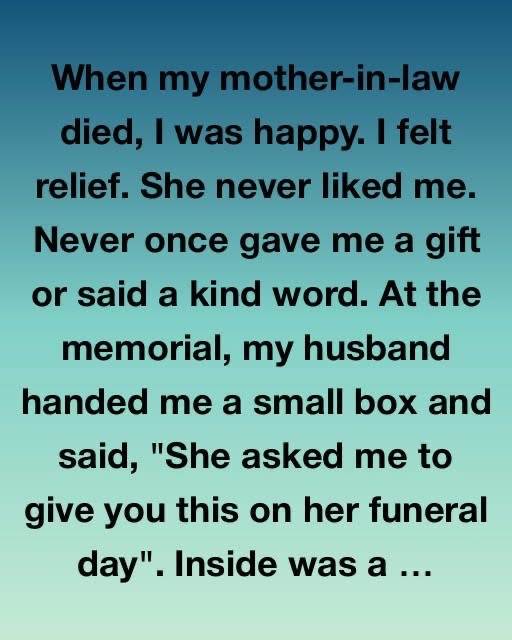When my mother-in-law died, I didn’t cry. I didn’t feel sadness. What I felt was relief. She had never liked me. Not once in the ten years I’d been married to her son did she give me a gift, say a kind word, or even pretend to approve of me. Every holiday was an icy performance. Every family dinner, a test I could never pass. So yes—when she passed, I felt… free. At the memorial, my husband slipped me a small velvet box. “She wanted you to have this,” he whispered. “She said you should open it today.
Alone.” That word—alone—stung. Later that night, after the guests left and our son was asleep, I opened it. Inside was a delicate silver necklace with a teardrop-shaped sapphire pendant. Old, vintage. But what made me pause wasn’t the sapphire: it was the engraving on the back—two initials. My initials. I found a folded note, in her handwriting. “If you’re reading this, I’m gone. And if you’re reading it, I finally grew a spine. I never said it when I should have, but I was wrong about you… I judged you because of what you reminded me of… You were young, driven, outspoken—until I lost that part of me… The necklace was mine. L for the man I loved once. T for the daughter I never had. I see her in you.” I pressed the pendant to my chest and cried like I hadn’t in years. Then at the will reading, I learned she had left me a brass key and a note: “She’ll know what it’s for.” I climbed to the locked attic in her house. Inside an old trunk I found her journals—from her dreams of moving to Paris to confessions of feeling trapped. I sobbed. A note, a photo, a painting with the caption “Me, before I disappeared.” Weeks later I received another letter and a check.
The money was hers telling me: “If you ever decide to chase your own dream…” I used it to open a small gallery space downtown devoted to overlooked artists. I named it The Teardrop after that pendant. Three years later the necklace rests on my collarbone most days. The journals now hang in the gallery for anyone who wants to know her story. My husband visited the gallery and stood quietly, tears filling his eyes: “I never knew she felt this way.” She wasn’t just bitter—she was wounded and silenced. In the end she gave me her truth, her hope that I’d live differently—and in that final act of love, she turned me into the daughter she never had.
